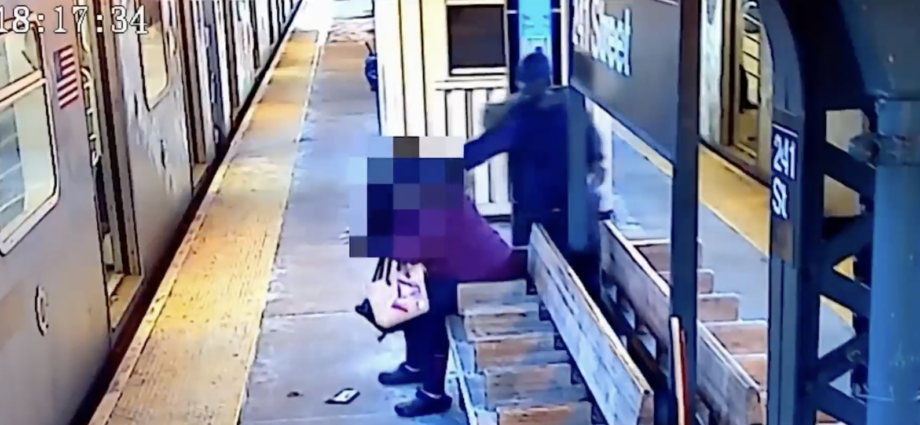Smearing Poop on Woman’s Face, Saying F-you to Judges, and Hate Crimes: New York Bail Reform Fails Again
To say that you can’t write this stuff is so cliché we are wondering how it remains in the first sentence of this message. But really, when you are going to use a cliché you had better do it well. And in this case, you really just can’t write this stuff.
Enter thirty-seven-year-old Frank Abrokwa. While it is easy to label Mr. Abrokwa as the poster boy of Albany’s failed bail reform policies, there are simply too many poster boys to count. In fact, it’s a stack of posters—not just one. But we would put Mr. Abrokwa’s case up against really any of the others we have seen.
Mr. Abrokwa, on February 21, decided he was going to hit on a 57-year-old woman in the New York City subway. “Hey, mami, hey, mami, why don’t you talk to me?" Of course, this happens all the time in New York, right? And guys like Abrokwa get rejected all the time, right? Right. After Mr. Abrokwa gets rejected, however, he was not happy about it.
Moments later, Abrokwa decided to take matters into his own hands—literally. He defecated in his own hands, and then smeared the contents on the 57-year-old woman, all over her “face, head, neck, shoulder, and back area” while yelling “You like that b----?” If that wasn’t enough to inspire love in the city that never sleeps, he decided he would beat the woman on her head with a hammer.
Responding, the NYPD did what they normally do: they solved the crime, lock up this jerk, and took him down to the station house. In Court, Mr. Abrokwa, trying to dodge a protective order, aptly pointed out, “I don’t know that b----.” When it came time for the judge to speak directly to Mr. Abrokwa, he was apparently interrupted by the Judge, a female jurist. At the outrage of being interrupted, Mr. Abrokwa said, in open court, “Why are you disrespecting me? Why am I being mistreated by the system? I’m talking to my attorney. F--- you, b----.”
Then what? Well, you guessed it, smearing your own excrement on another person and beating them up with a hammer is not a bail eligible offense under New York’s Bail Reform Laws. So, the Judge in the case, despite being called a “b----” and being told “F--- you” was forced to release Mr. Abrokwa on a personal recognizance bond, unable to impose bail to require someone to secure his release or to leave him in jail pending trial.
The NYPD, rather than letting Mr. Abrokwa walk free, realized he was wanted in a prior hate crime. In that case, in September 2021, he engaged in an anti-Semitic attack, where he called a man a “F------ jew,” threatened to kill the man, tried to punch the man, and then later chased him down the street. So, the NYPD arrested him again not wanting Mr. Abrokwa back out on the streets. And again—he got out on his own recognizance, this time with “supervised release,” a word that sounds like something is happening when in fact nothing is happening. In fact, on February 21, when he attacked the woman, he already had three pending cases against him for which he got a zero-bail release including two for randomly punching persons in New York City.
The Executive Director of the Metropolitan Transit, Janno Lieber, had this to say: “I'm not a criminal justice expert but I don’t understand how someone who commits this kind of assault – which was violent, horribly victimizing a transit rider – can just walk free even when he has four other open cases against him, including two other transit assaults and a hate crime charge."
We are criminal justice experts, and we can tell you, this is pretty simple. If you change the law and prohibit judges from imposing bail based on the charge, then everyone will get out and have no accountability regardless of how many times they do it or how many times they did that and other bad things in the past. That’s pretty easy to figure out, which is why we should never look at the charge today to decide whether someone is a danger to the public. In Mr. Abrokwa’s case, we have to think that under the old system when you call a judge a “f------ b----” at a bail setting hearing, that’s going to result in a higher bail and not a free pass on a personal recognizance bond.
In New York under bail reform, a man with twenty prior arrests can smear feces on a woman and beat her with a hammer, punch two other people, steal burglary tools, and threaten to kill a Jewish man because he’s Jewish – and get promptly released back on the street with no bail or accountability. What do lawmakers in Albany say who support bail reform? It’s working.
Bail reform is not working. The fact is judges know what to do but judicial discretion has been restricted under New York’s bail reform. If we are going to let people like Mr. Abrokwa continue to act this way, there’s no wonder there is a crime wave.



Facebook Comments